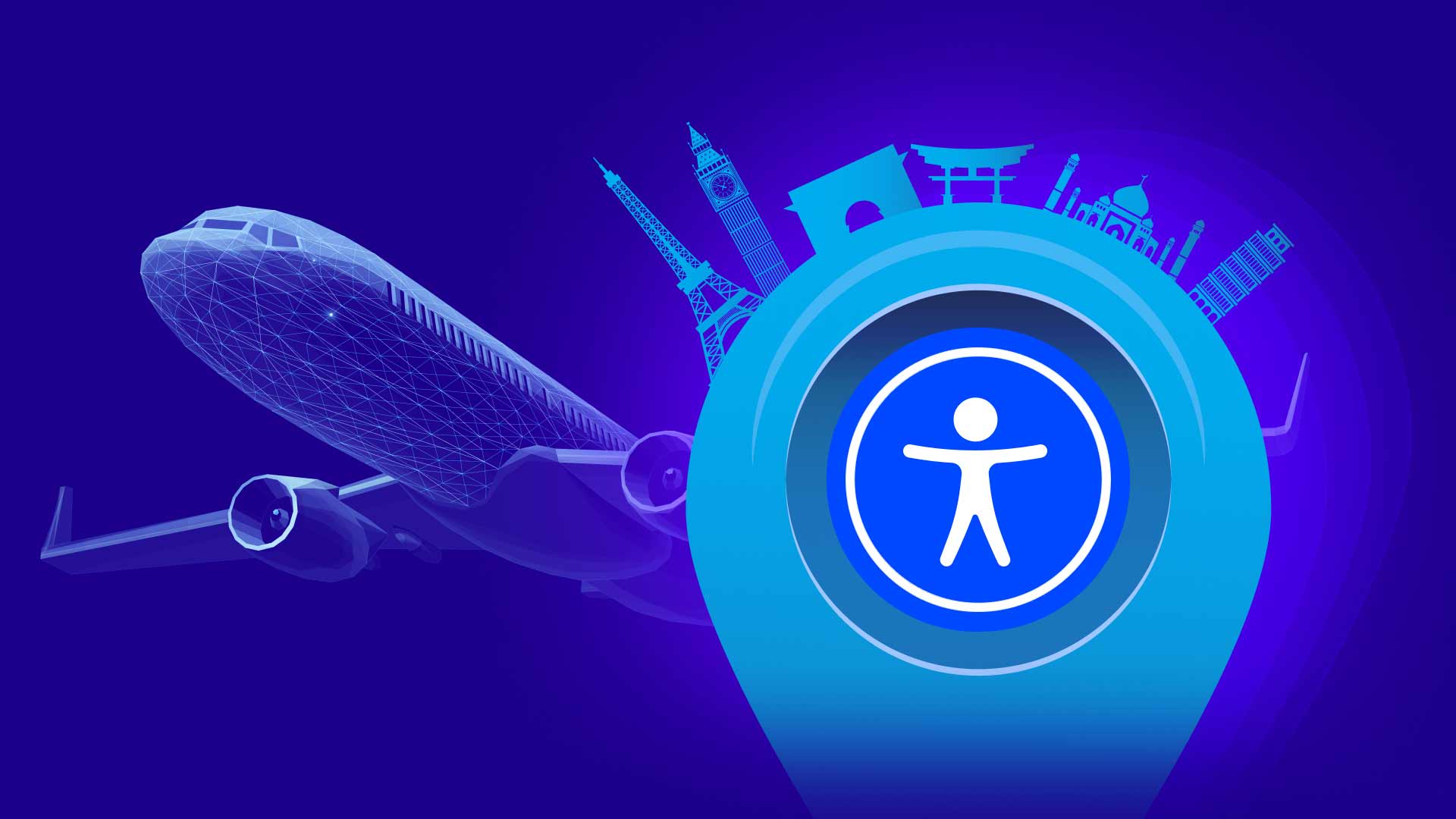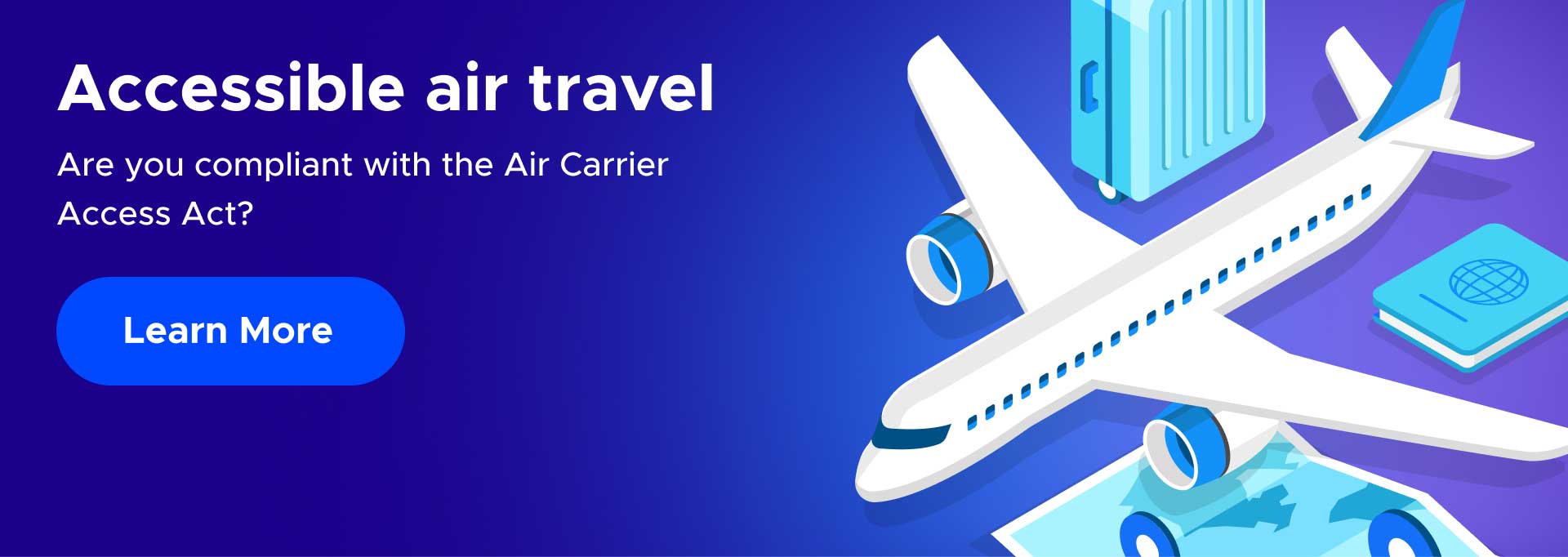Air Carrier Access Act (ACAA): Its Requirements & Improvements to Travel Accessibility

Enacted in 1986, the Air Carrier Access Act (ACAA) is landmark legislation that ensures Americans with disabilities have equal access to air travel. People of different abilities now rely on the digital world for almost everything, including air travel. So, unsurprisingly, the ACAA’s focus has evolved beyond physical requirements to keep up with rapidly changing technology. This blog explores the act’s key provisions and the inclusion of digital accessibility for airline passengers in the modern era.
Let’s start with a better understanding of the act and how it relates to personal rights.
Airline Passenger Rights Per the Air Carrier Access Act (ACAA)
The ACAA aims to accommodate airline passengers with disabilities, regardless of the nature or extent of their disability. Some of the key benefits include:
- Non-Discrimination: Airlines cannot discriminate against individuals with disabilities. They cannot deny boarding to a passenger with a disability unless there is a legitimate safety concern. If a carrier excludes a person with a disability on safety grounds, it must provide a written explanation of the decision.
- Accessibility: Airlines must ensure their aircraft are accessible to people with disabilities, including accessible lavatories and seating arrangements that accommodate wheelchairs.
- Assistance Services: Carriers are required to assist airline passengers with disabilities, such as help with boarding and deplaning, storing and retrieving carry-on items, and navigating the airport.
- Communication: Airlines must ensure that individuals with hearing or vision impairments can communicate effectively, including providing accessible information and communication systems.
- Service Animals: Passengers with disabilities can bring their service animals on board the aircraft at no additional charge.
- Accessibility of Facilities: Airports are also subject to accessibility requirements under the ACAA, including accessible facilities, restrooms, and transportation to and from the terminal.
- No Passenger Quantity Limits: Carriers cannot limit how many people with disabilities book a specific flight.
- Solitary Travel: Airlines cannot require people with disabilities to travel with another passenger, with few exceptions. In isolated cases, rules allow airlines to require safety assistants, but they can never charge for their services.
So, how has the ACAA adapted to embrace the latest digital tech?
The Evolution of the ACAA and Digital Accessibility
While the ACAA initially focused on physical accommodations, it’s abundantly clear that digital accessibility—including airline websites, mobile apps, kiosks, and in-flight entertainment systems—is now essential to ensure an equitable travel experience.
The ACAA addresses digital accessibility in the following ways:
- Accessible Websites: Carriers must ensure their flight booking websites are digitally accessible. Information about flight schedules, reservations, and other services must be available in formats easily understood by screen readers and other assistive technologies.
- Mobile Apps: Mobile apps for booking tickets, checking in, and receiving flight updates must be accessible.
- In-Flight Entertainment: In-flight entertainment systems that include movies, TV shows, and music must be accessible to passengers with disabilities, including those with visual and hearing impairments.
- Self-Service Kiosks: Self-service kiosks for activities like check-in and printing boarding passes must equally accommodate people with disabilities, including those who rely on assistive technology.
- Communication: Airlines must ensure that individuals with hearing or vision impairments can communicate effectively during the flight and at the airport. Video relay services are one example of accessible communication.
Benefits of Digital Accessibility Under the ACAA
Integrating digital accessibility into the ACAA has led to numerous and long overdue benefits for people with disabilities:
- Independence: Accessible digital tools and services empower passengers with disabilities to independently use flight booking sites, check in, access information, and enjoy the in-flight entertainment.
- Information Equality: Accessible airline websites and apps ensure that individuals with disabilities can access real-time flight updates, gate changes, important announcements, etc.
- Inclusivity: Digital accessibility promotes inclusivity by allowing individuals with a wide range of disabilities to participate fully in the air travel experience, which aligns with the spirit of the ACAA.
- Compliance: Airlines prioritizing digital accessibility not only fulfill their legal obligations under the ACAA but also reduce the risk of litigation and reputational damage. Compliance benefits both passengers and airlines.
Helping Inclusivity Take Flight
The ACAA has made big strides in incorporating digital accessibility, but technical, financial, or logistical constraints mean some airlines and airports may still struggle to meet its standards. Plus, digital technology is on a continuous fast track that requires ongoing updates to ensure accessibility. That’s why airlines, airports, regulators, and disability advocacy groups must work in unison to address these challenges. Continued education and awareness campaigns also help keep stakeholders informed about the importance of digital accessibility under the ACAA.
Undoubtedly, the ACAA has adapted to help ensure people with numerous disabilities have equal access to the full range of services and information. However, that adaptation must continue as the need for greater inclusivity will only grow. And digital accessibility isn’t just a legal requirement—it promotes inclusivity, independence, and equality in air travel and all industries. By prioritizing and investing in digital inclusivity expansion, the aviation industry can ensure that the ACAA’s goals are fully realized for all passengers, regardless of their abilities.
See how UserWay increases digital accessibility and helps ensure regulatory compliance for all businesses and industries.
Digital Accessibility Soars With UserWay
In the air or on the ground, UserWay helps millions of organizations worldwide increase digital accessibility and meet critical compliance standards. Learn how Userway’s products and services can help your inclusivity efforts achieve a higher standard today.
Answers to Common FAQs
How Do the ADA and the Air Carrier Access Act Differ?
The ACAA doesn’t provide for private rights of action, so airline passengers can’t enforce their rights under the ACAA through civil litigation in U.S. courts.
Who Enforces the Air Carrier Access Act?
The Department of Transportation enforces the ACAA, which applies to all flights to, from, or within the United States.
Is the ACAA an International Act?
The provisions of the ACAA cover all domestic and foreign airlines doing business in America. The U.S. Department of Transportation issued specific airline requirements to enforce the ACAA in 1990.





Share